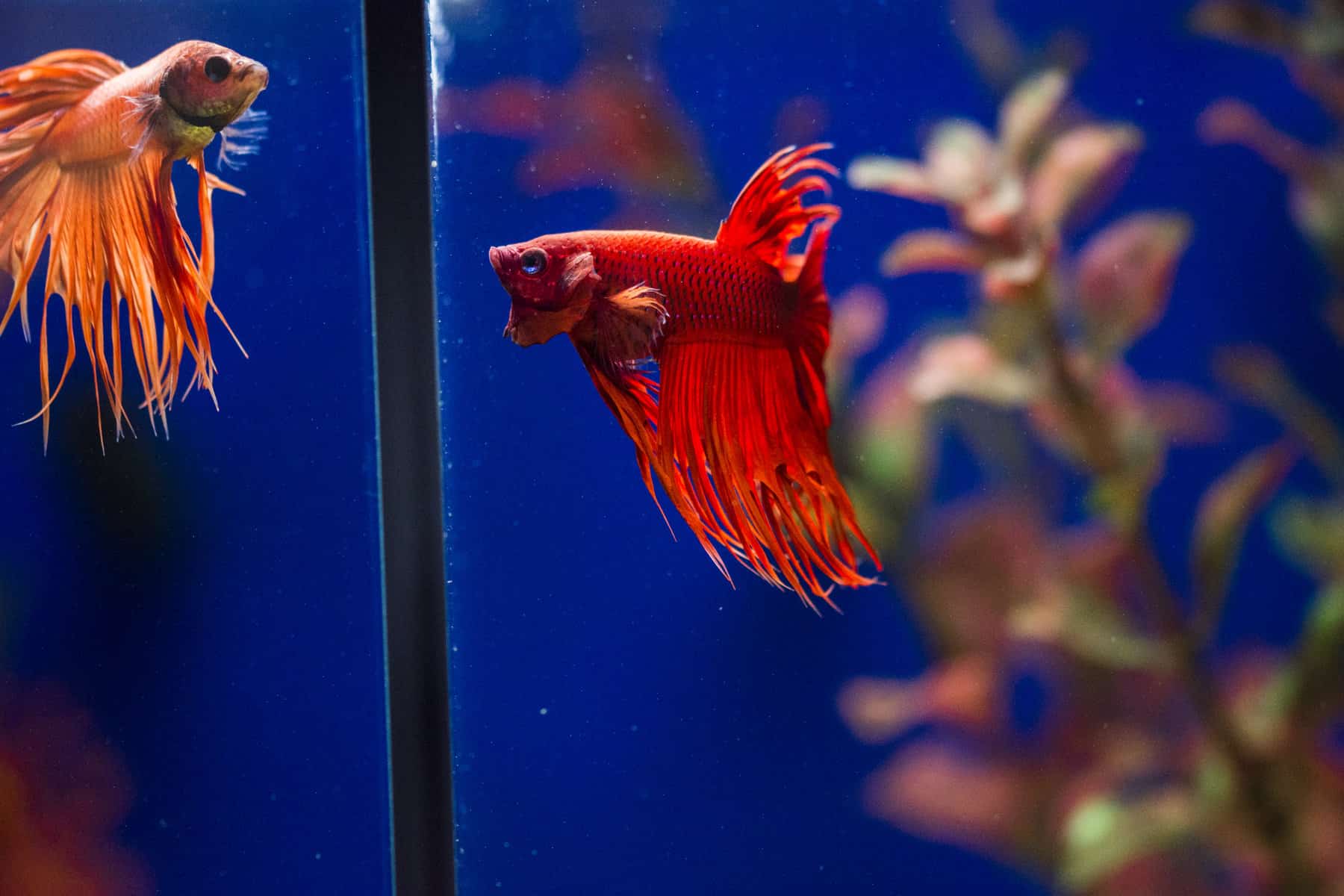Betta fish are intelligent little creatures full of character and can make great pets. With patience, you can even teach your betta a few cool tricks!
But the main reason people choose bettas is because of the fish’s beautiful looks. Bettas, or Siamese Fighting fish, come in a dazzling range of colors, and many varieties have incredible, flowing fins and tails.
So, if you notice your betta buddy’s fins curling, that’s a cause for concern.
In this guide, we investigate why a betta’s fins curl and discuss what you can do to cure and prevent that from happening to your precious pet.
What Causes Betta Fish Fin Curling?
There are several causes of curled, damaged fins in betta fish.
Once you know what’s most likely causing the problem, you can learn how to treat your pet and prevent the condition from recurring.
Old Age
Bettas have an average lifespan of two to four years. However, you can extend that by a year or two if you provide your fish with excellent living conditions and a high-quality, varied diet.
But just like any living creature, betta fish eventually get old, and one common sign of that is fin damage, including curling, fraying, and twisting.
Unfortunately, there’s nothing you can do to prevent the natural aging process and it can’t be treated.
Genetic Defects
Sometimes, curling betta fins can be caused by a genetic anomaly.
If a betta was born with curled fins, it’s likely some of his offspring will have the same physical defect. Unfortunately, the only way to prevent that is to euthanize the betta fish in question or ensure you don’t breed from it.
When choosing your betta pet, take care not to buy a juvenile betta that has curled fins or even a very slight deformity.
Any abnormality tends to become more exaggerated and pronounced as the fish matures, so if the betta you’re considering looks anything other than perfect, it’s safest to choose another.
Physical Trauma
As you know, male bettas are aggressive fish and can be territorial, especially toward other male bettas. For that reason, you must never keep two male bettas in the same tank.
Although you can keep a betta in a community tank with many different fish species, squabbles can break out, especially if you have an especially belligerent betta.
Fights often result in injuries to a betta’s fins and tail, which can result in permanent scarring and curling.
Be careful when choosing decorations for your betta fish tank. Pointy objects, rough surfaces, and sharp edges can easily snag on a trailing tail or fin, causing injuries to your pet. Even sharp pieces of the substrate can inflict damage on your betta.
Many injuries resolve themselves, and the damaged fin naturally repairs itself with no long-lasting effects. However, there’s no guarantee that your beautiful betta will be the same as he was before the injury.
Treatment
The best way to treat injuries to your pet fish’s fins and tail is to add an antibacterial medication to the tank to prevent an infection from taking hold.
Sometimes, an aquarium salt bath is also effective in cleaning and treating a wound if you prefer not to use chemicals in your tank.
If you keep invertebrates, such as shrimp and snails, as tank mates for your betta, be sure not to add any medication containing copper to your fish tank. Copper is extremely dangerous to many inverts and can kill them.
Prevention
If you notice your betta fighting or being harassed by fish in his tank, you must remove the offending tank mate and rehouse it.
Unfortunately, some bettas are simply too aggressive to be housed with any other fish and must live alone.
Don’t worry, your betta won’t be lonely! In the wild, bettas are solitary creatures, so if your pet lives alone, he’ll be fine as long as you enrich his habitat with plenty of plants, safe decorations, caves, and toys.
Finally, when buying any decorations for your betta tank, double-check that they have no abrasive surfaces or sharp edges that could injure your betta before you put the items in the aquarium.
Water Hardness
When we talk about water hardness, we’re referring to the mineral levels in the water. The hardness of water is directly related to pH, and essentially the harder the water, the more dissolved minerals it contains and the higher the pH.
All fish have a particular tolerance for water hardness. For example, betta fish prefer water with a hardness range of 5 to 20 dGH. If the water is too hard, your betta’s fins could curl.
Treatment and Prevention
Some regions use water systems that contain water softeners, so water hardness isn’t generally an issue in these areas. However, if your tank has imbalances in water parameters, you can rebalance it by using a water softener from your local fish store.
Of course, once the water hardness in your aquarium has been adjusted appropriately, your betta’s fins should return to their normal, luxuriant state.
That said, we recommend you test your fish tank water every week to ensure the pH and water hardness levels are within your betta’s tolerance levels.
Poor Water Conditions
In addition to the water hardness, you need to ensure the other water parameters are suitable for your betta fish.
Among the water criteria that need to be met is the temperature. The water temperature should be between 78 and 80 F. If the temperature falls too low or becomes excessively high, your betta could suffer from temperature shock, which may kill him.
In addition, the levels of ammonia and nitrite in the water must be zero, with nitrates around 20 ppm. All these chemicals are highly dangerous to fish and will cause numerous signs of ill health, including your betta fish fins curling.
If you don’t take steps to correct the quality of water in your tank and maintain it, your betta will die.
Treatment and Prevention
The best way to treat and prevent betta curls is to carry out regular water checks and changes of around 20%, replacing the dirty water with dechlorinated tap water.
Vacuum the bottom of the tank around plant bases and decorations, in the tank corners, and under the filter housing to remove organic waste and leftover food that would otherwise rot in the tank, polluting the water.
We recommend removing your filter media from the unit every couple of weeks. Rinse it to remove sludge and prevent the impeller from becoming clogged. You’ll also need to replace the filter media periodically, in line with the manufacturer’s guidelines.
Use an aquarium water testing kit every week to check the water’s chemistry and cleanliness.
Stressed Betta

Stress is a major killer of all aquarium fish. When fish become stressed, their immune system is compromised, leaving the fish open to attack by diseases and parasites.
Bacterial infections can cause curled fins, as well as symptoms such as red patches on the skin, ulcers, and swellings.
You can prevent stress in betta fish by providing your pet with a tank of at least 5 gallons, including plenty of decorations, plants, and toys in the setup, and offering your pet a high-quality, varied diet.
Tank mates should be peaceful and not aggressive toward your betta. If you have a very feisty betta fish, try including some snails or shrimp to keep him company.
Disease
Several diseases can cause your betta to develop curled fins as a symptom.
Exophthalmia (Popeye Disease)
Popeye is a disease in bettas that causes the fish’s eyes to bulge right out of the creature’s head. In addition, some bettas curl or clamp their fins if afflicted with this disease.
Exophthalmia has several causes, including physical trauma and bacterial infection.
Velvet Disease (Piscinoodinium pillulare)
Velvet disease is caused by an aquatic parasite that attacks both freshwater and marine fish. The disease causes a variety of symptoms, typically including lethargy, rubbing against objects in the fish’s habitat, and clamped or curled fins.
Infected fish often develop a rust-colored, yellow, or white powdery coating across their bodies.
If treated quickly, Velvet disease can be cured relatively easily with medication from your local fish store. However, the parasite spreads rapidly, quickly affecting your whole tank.
Ich (White Spot Disease)
Ich is also known as White Spot disease or Ick and is caused by an Ichthypthirius multifiliis aquatic parasite.
White Spot is a very common parasitic disease that attacks tropical, coldwater, freshwater, and marine fish species, usually when the fish are stressed or injured.
Although this disease has many symptoms, including rubbing against solid surfaces within the aquarium and a rash of tiny white spots, infected fish also curl or clamp their fins.
Fortunately, if spotted early, Ich can be treated with over-the-counter medication.
Final Thoughts
Did you enjoy our guide to curled fins in betta fish? If you found the information helpful, please share the article before you go.
Betta fish fin curling can have several causes, including incorrect water parameters, disease, stress, physical trauma, and old age.
First, you need to work out why your betta buddy’s fins are curling. Once you know what’s causing the problem, you can take steps to fix it.
How did you solve your betta’s fin curling problem? Tell us about your pet in the comments box below!


























